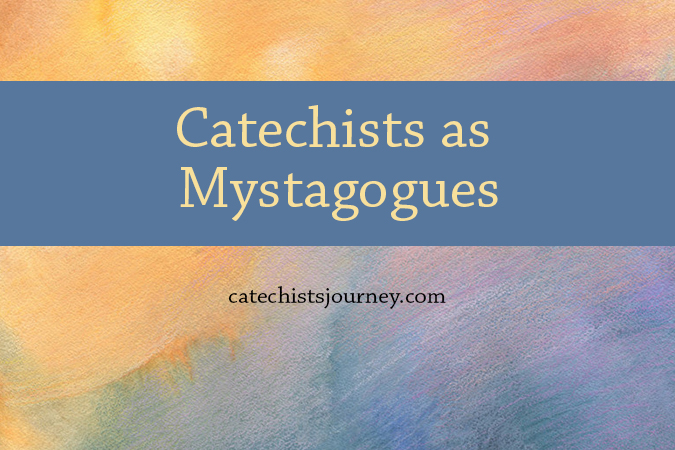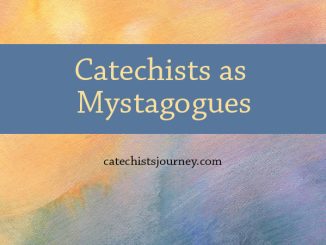
People demand to see results. That’s nothing new. Before we purchase something, we want to hear and see unsolicited endorsements from previous purchasers. Before we vote for someone, we want to know about the candidate’s previous accomplishments. So, it should come as no surprise that, when John the Baptist found himself imprisoned for “campaigning” on behalf of Jesus, he (John) sent some of his disciples to Jesus to confirm that Jesus was indeed the Messiah. Jesus replied: “Go back and report to John what you have seen and heard: The blind receive sight, the lame walk, those who have leprosy are cleansed, the deaf hear, the dead are raised, and the good news is proclaimed to the poor.” (Luke 7:22)
Those we teach and form in faith are no different. They want to know what Jesus has done for others and what he can do for them. It is the job of the catechist to proclaim these mighty deeds of the Lord, and we do this by telling stories! A teacher delivers a lecture. A mystagogue tells stories. As we continue our series of exploring the catechist as mystagogue, let’s take a closer look at the kinds of stories we can and must be sharing.
The Directory for Catechesis reminds us: “In the kerygma, the active figure is the Lord Jesus, who manifests himself in the testimony of the one who proclaims him; the life of the witness who has experienced salvation therefore becomes that which touches and moves the hearer.” (58)
This testimony often takes the shape of storytelling, or “narration” as described by the Directory:
“Narrative language…fosters the experiential dynamism of the faith because it involves the person in all his dimensions: affective, cognitive, volitional. It is therefore good to recognize the value of narration in catechesis because it accentuates the historical dimension of the faith and its existential significance, richly interweaving the story of Jesus, the faith of the Church, and the lives of those who recount and listen to it. (208)
In particular, there are three kinds of stories that the mystagogical catechist is called to proclaim:
Scripture
The Bible is packed with great stories that capture the imaginations of listeners young and old. By sharing stories from the Bible, we help those we teach to interiorize the narrative of salvation history that can be summed up in three words: rescue, restoration, and reassurance. (Be sure to check out this post about storytelling with a digital twist!)
Lives of the Saints
Faith formation has long relied on the practice of telling stories of the saints to illustrate how people throughout the ages have put the Gospel into practice in their everyday lives.
Personal
This is perhaps the one category that is new to many of us and one with which we are not always comfortable. However, it is absolutely crucial that we give witness to our faith in Jesus and how he has transformed us in small and big ways. St. Paul VI once wrote, “Modern man listens more willingly to witnesses than to teachers, and if he does listen to teachers, it is because they are witnesses.” (Evangelii Nuntiandi) As my friend Jared Anderson wrote:
Witness, when done well, opens up the hearers to examine their own lives and see where the Spirit is moving and inviting them to greater things. Such moments start off like a window, with the hearers looking from the outside in, and they finish like a mirror, with the hearers looking into their own lives.
For help in becoming a better storyteller, check out Chapter 7 of The Catechist’s Backpack: Spiritual Essentials for the Journey by Julianne Stanz and me. Also read this previous post on storytelling.
May we all find the grace we need to proclaim stories of how the Lord, Jesus Christ, has transformed our lives and the lives of countless others!





Be the first to comment